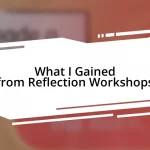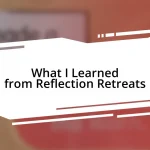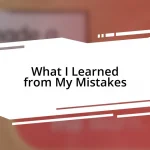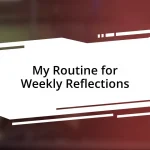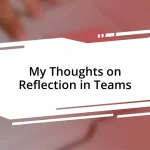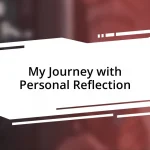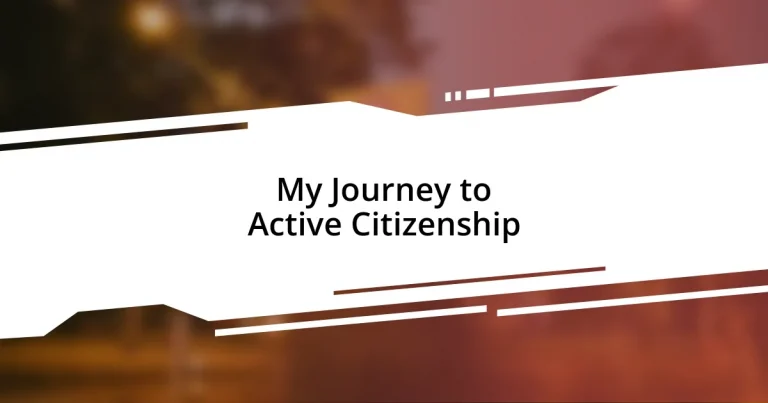Key takeaways:
- Active citizenship involves community engagement, highlighting the impact of small actions like volunteering and advocacy.
- Building relationships with local leaders fosters collaboration and strengthens community ties.
- Documenting personal experiences and measuring the impact of involvement helps to understand and enhance contributions to the community.
- Identifying local issues through community interaction and participation empowers citizens to effect change.

Understanding Active Citizenship
Active citizenship transcends mere legal status; it embodies a commitment to community engagement and social responsibility. I remember when I first volunteered at a local shelter. At that moment, I realized how vital it is to contribute my time and energy for the greater good. Isn’t it fulfilling to be part of something larger than ourselves?
The essence of active citizenship lies in understanding our rights and responsibilities as participants in society. It pushes us to ask ourselves, what impact are we making on our community? When I began attending town hall meetings, I was surprised to see how my opinions could influence local decisions. It was empowering to transform my voice into action.
Engagement can take many forms, whether through voting, volunteering, or advocacy. I’ve often wondered: how can a single person make a difference? My experience taught me that even small actions—like organizing a neighborhood clean-up—can inspire others and foster positive change. It’s a reminder that every citizen has the power to shape their environment and community dynamics.

The Importance of Community Engagement
Engaging with the community is essential for fostering a sense of belonging and connection. I remember attending a local festival that celebrated our diverse backgrounds. The joy on people’s faces as we shared stories, food, and laughter truly reminded me how engagement can strengthen community bonds. It made me realize that active participation goes beyond personal benefits; it enriches our shared experience and cultivates unity.
One significant aspect of community engagement is the advocacy it encourages. I once joined a group that campaigned for better public transportation in our area. Witnessing how our collective voices led to positive changes was exhilarating. It highlighted the fact that when individuals come together, we can tackle issues that matter to all, creating a more just and equitable environment.
Moreover, community engagement promotes accountability. When I volunteered for a local organization, I quickly learned how my efforts made a tangible difference. My experience taught me that by holding ourselves and others accountable for our actions, we can create a culture of respect and responsibility. It was empowering to see how my contribution was valued and recognized, motivating me to continue striving for a better community.
| Aspect of Community Engagement | Personal Experience |
|---|---|
| Sense of Belonging | Participating in a local festival strengthened my connection with neighbors and celebrated our diversity. |
| Advocacy | Joining a campaign for better public transportation showed me the power of collective action and how it can prompt real change. |
| Accountability | Volunteering for a local organization taught me the importance of responsibility and how individual contributions are valued. |

Identifying Local Issues to Address
Recognizing local issues often starts with simply paying attention. I’ve found that walking through my neighborhood can reveal subtle yet impactful challenges. For example, during one of my strolls, I noticed an alarming number of vacant lots that had become dumping grounds. It struck me how such spaces could instead be transformed into community gardens or parks, nourishing both the environment and our community spirit.
Here are some key steps I recommend for identifying local issues effectively:
- Engage with neighbors: Conversations can unveil shared concerns that may otherwise go unnoticed.
- Attend community meetings: These gatherings are treasure troves of insights into pressing matters facing the community.
- Research local reports: I often skim through neighborhood newsletters and online forums for updates and discussions about ongoing issues.
- Participate in local events: These opportunities allow you to immerse yourself in the community and observe issues firsthand while connecting with others.
- Document your observations: Keeping a journal of things that catch my eye helps me prioritize which issues to tackle first.
Taking these steps has enriched my understanding and made me more attuned to the needs around me. When we become aware of what needs addressing, we empower ourselves to take action.

Building Relationships with Local Leaders
Building relationships with local leaders has been pivotal in my journey toward active citizenship. I remember the first time I reached out to a city council member; I was both nervous and excited. To my surprise, they were incredibly approachable and genuinely interested in hearing my thoughts about the community. This initial conversation sparked a cascade of opportunities, illustrating how vital such connections can be.
Establishing these relationships often requires a blend of persistence and openness. For example, I frequently attend town hall meetings, where I not only voice my concerns but also listen to the leaders’ perspectives. I’ve found that value lies in understanding their challenges too. Have you ever considered how much insight comes from simply listening? It opens doors to collaboration and shared solutions, making me feel more connected to the decision-making process.
Over time, I’ve learned that building rapport with local leaders is also about showing appreciation. On one occasion, I thanked a leader for their efforts in improving our local park. The gratitude they expressed was heartfelt, and it created a bond between us. This experience taught me that small gestures of recognition can strengthen relationships and encourage them to keep fighting for the community we’re both passionate about.

Creating a Personal Action Plan
Creating a personal action plan for active citizenship is a transformative process that keeps me focused and motivated. I remember sitting down one evening with a notebook and listing my goals: improving local green spaces, enhancing neighborhood safety, and fostering youth engagement. Breaking these down into specific, actionable steps made them feel achievable. For instance, instead of just saying, “I want to clean up the park,” I wrote, “Organize a cleanup day with neighbors on the first Saturday of the month.” This specificity turns dreams into concrete plans.
I also found it essential to set timelines for my goals. Early on, I struggled with procrastination, but once I put dates to my objectives, something shifted. It became a game-changer for me. One of my goals was to host a community safety workshop. Initially, I thought I could do it whenever. However, committing to a date helped me rally support and share information creatively, keeping me accountable. Have you ever noticed how deadlines can ignite a spark of urgency? That’s been my experience.
Ultimately, I recommend regularly revisiting and adjusting your action plan. There have been times when I felt overwhelmed or lost the momentum, so I took a step back to reassess my priorities. Recently, I realized I had too many projects on my plate, and I needed to focus more on collaborating with others instead of going solo. This adaptability not only reduces stress but also ensures that the plan remains relevant to my evolving community needs. How do you stay flexible in your journey?

Engaging in Volunteer Opportunities
Engaging in volunteer opportunities has been a cornerstone of my active citizenship journey. I remember the first time I joined a community food drive. At first, I felt out of my element, surrounded by seasoned volunteers who seemed to know exactly what they were doing. But as I began sorting and packing food items, a sense of camaraderie emerged. I realized that everyone, regardless of their background, came together for a shared purpose. Have you ever found yourself stepping into a new experience, only to discover a hidden passion for it?
Volunteering has also provided me a window into the real needs of my community. One weekend, I volunteered at a local shelter, and it was eye-opening. Listening to the stories of individuals facing homelessness stirred something deep within me. It made the statistics I had read previously come alive. I felt a strong urge to advocate for more support systems in our community. How many opportunities do we miss to learn and grow simply because we hesitate to step outside our comfort zones?
Moreover, embracing these opportunities has been incredibly fulfilling. I often reflect on a particular project where I helped organize a youth mentorship program. The excitement on the kids’ faces as they engaged with their mentors was priceless. It reminded me just how impactful my contributions could be. When was the last time you did something that not only challenged you but also made a tangible difference in someone else’s life? In my experience, engaging in volunteer work has woven a rich tapestry of connections and revelations that truly enhance my role as an active citizen.

Measuring the Impact of Involvement
Measuring the impact of involvement in community activities is crucial to understanding the difference we can make. For me, I’ve often turned to feedback from peers and community members; their impressions serve as a valuable gauge of my contributions. After organizing that neighborhood cleanup, the heartfelt thank-yous from my neighbors really struck a chord with me. Have you ever noticed how a few words of appreciation can fuel your passion?
Another method I use is reflecting on personal growth. I keep a journal to document not just what I’ve done, but how I’ve changed through my experiences. One entry detailed my feelings after leading a workshop on civic engagement—I felt more confident and capable than I ever had before. It’s fascinating how involvement can impact not just the community, but us as individuals. Have you kept track of your growth through your own experiences?
Lastly, I’ve learned to analyze tangible changes in the community as indicators of success. For instance, after my advocacy for improved lighting in a local park, I noticed many families using it after dark. It felt incredible to witness direct results from my efforts. Measuring impact isn’t just about numbers; it’s about the stories and the lives touched along the way. How do you measure the significance of your contributions to make them feel truly meaningful?


